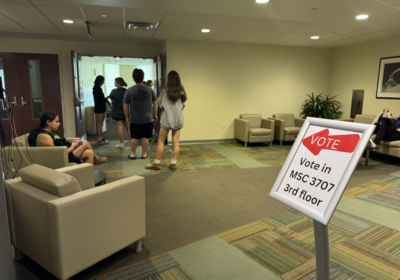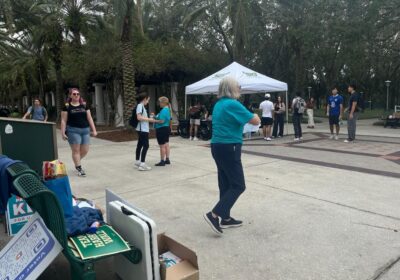Zimmerman school receives half-million dollar donation worth of film industry-level equipment

The Zimmerman School of Advertising and Mass Communications upgraded one of its studios with a donation from video production company Diamond View Studios, a five-time Emmy award-winning video agency in Tampa, that includes top-tier technology being used in the film industry across the world.
The donation included LED volumes, which is an enclosed area that captures motion and real-time compositing in a virtual environment to be produced on camera for TV, a computer to run them with Adobe Premiere Pro as well as with Unreal Engine, a real-time 3D creation platform for immersive visuals, installed in it, Sony cameras, tracking devices for the cameras and a set of LED lighting.
All the equipment adds up to $520,000, according to Justin Brown, USF alum and marketing director at Diamond View.
Besides the technological pieces, Diamond View has also been training Zimmerman school staff to manipulate the equipment correctly and use it in classes. Brown said the training and assistance amounted to an additional $39,000.
“We know that this is something that’s complicated for people, we want to make sure that you guys [at USF] are also set up on how to use it,” Brown said. “So we’re really just starting out that time in service for them to make sure that they feel like they’re set up for success.”
Steve Mutimer, teaching lab manager at the college, said that in addition to the donation, he is buying small equipment such as video switchers and an intercom system from a list he did with Ryan Watson, Zimmerman instructor, to add to the experience of the studio. Added up, the equipment could cost about $59,000, a budget that Mutimer said the dean of the College of Arts and Sciences approved.
“They’re giving us all these things, but we thought we also need some of these other things to do what we knew we were going to teach in the course,” Mutimer said.
“Also, some of those things benefit everybody that’s in electronic field production, and also maybe like broadcast news or a rookie class that really doesn’t get to use the equipment, they’re now getting to use some of the older field cameras, because that budget allowed us to buy some newer cameras.”
Watson, as well as Director of the Zimmerman School of Advertising and Mass Communications Kathy R. Fitzpatrick, declined to comment until a formal announcement of the partnership was made. A launching event will also take place in mid-October.
The technology Diamond View donated and the softwares used with it is what the film industry is leaning toward, according to Brown. He said the donation is also a local investment so the future workforce is trained with the modalities currently used in the virtual production world.
“So making sure that there is a workforce that you train, because we need to be honest, even in Florida, it’s really hard to find good talent,” Brown said. “So the best way to do that is to grow locally by investing in the people who invested in us. So really, it’s helping them grow in the ways that, again, we all had access to when we were younger.”
Although USF hasn’t made an official announcement about the donation, some professors and students in the school have been able to visit the studio and see the new equipment. Mutimer said the studio will be available for students enrolled in a Zimmerman program for educational purposes, most likely under the supervision of a professor.
“It’s available for anyone in our program, with a reason and maybe a mentor, professor like a reason why,” Mutimer said. “[If] someone’s in a class that’s completely unrelated to that room, I’m sure we will try to accommodate them, but they would probably have to have a reason and it would have to probably be tied to a school assignment.”
At least half of the staff at Diamond View graduated from USF, Brown said, and they want to give back to the institution that helped them grow to who they are today. They also see it as an opportunity to prepare students for the workforce.
“We’re giving back to the [school], making sure they have the top-of-the-line stuff. But they’re also getting trained for the market that they’re going to walk out into right now, which is the one that we’re kind of playing around in,” Brown said.
“So it’s like we’re … trying to set people up in the same ways that the people before us probably did [with] donated equipment to build a studio for us to learn in.”
The new technology in the studio is an opportunity to broaden the scope of the current programs offered in the Zimmerman school, Mutimer said.
“I don’t think we’re leaving anything in the past or anything, I would say we’re broadening our scope here,” he said. “The students like it, [and] there’s a lot of people that want to maybe get a degree in mass [communications], but maybe work in kind of more of a film-ish commercial industry.”
Having access to the type of equipment that was donated at an early age could make students “immensely qualified” for the industry, according to Brown. As a former student, he said he would have dreamed of a studio like this one.
“At the end of the day, I’m just trying to put the same tools into the park,” Brown said. “Basically, my past self, if I was at that school, this is exactly the kind of stuff that I would dream to have. So that’s really it for us, and that’s why we’re doing it.”







